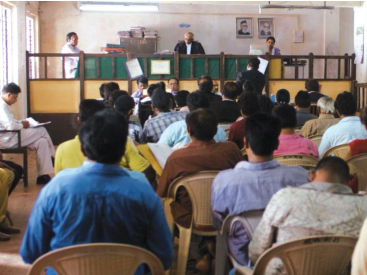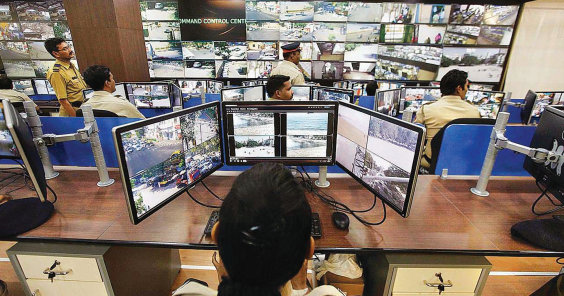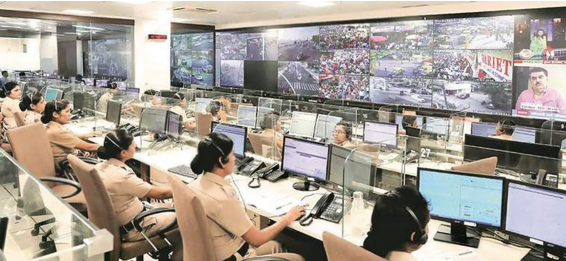Cybercrime Offences and Penalties in India
Each year, the number of reported cybercrimes across the country continues to rise significantly. One of the biggest challenges in combating cybercrime in India has been the lack of awareness regarding cybersecurity practices. Even when crimes are reported to the authorities, the existing infrastructure and processes for addressing such cases are often inefficient. India has only recently begun to establish a comprehensive cybersecurity framework to protect its large internet user base, which is the second largest in the world.
In 2018, the Ministry of Home Affairs in India established the Indian Cyber Crime Coordination Centre (I4C) as a framework to combat cybercrime. Subsequently, in 2019, the government launched the National Cybercrime Reporting Portal (NCRP) under the I4C initiative.
Cybercrime is defined as any illegal activity that involves a computer, network, or electronic device. With the increasing digitisation of the world, cybercrimes have become very common. Most of these crimes aim to cause financial, reputational, or active harm through illicit electronic means. While strict laws and penalties exist to punish cybercriminals and protect internet users, it is equally important for internet users to be more vigilant in order to prevent many cybercrimes.

Some common types of cybercrimes include:
Hacking: Unauthorised access to a computer or network with the intent to cause harm. Hackers may steal data, install malware, or disrupt systems.
Data Theft:
Stealing sensitive information such as usernames, passwords, financial details, and trade secrets from computers or networks.
Identity Theft:
Misusing a person’s private information, including name, date of birth, address, and credit card details, to commit fraudulent activities.

Cyberstalking:
Using electronic devices or the internet to stalk or harass someone, which can include intimidating emails, text messages, or posts. Phishing and Fraud: Deceiving people into divulging sensitive information, such as bank details or passwords, through emails, texts, or fraudulent websites.
Spreading Malware:
Intentionally distributing viruses, worms, and Trojan horses to damage computers, networks, or steal data. Denial of Service Attacks: Overloading servers or networks to disrupt online services for legitimate users.
Posting Illegal Content:
Uploading or sharing obscene, defamatory, or hateful material online, which is prohibited under Indian laws.

Cyber Terrorism:
Using cyber means to threaten national security, incite public unrest, or spread terror.
Cybercrime is on the rise in India as more individuals and businesses move online. To combat this issue, the Government has implemented strict laws and penalties for cybercriminals. The key piece of legislation is the Information Technology Act of 2000, which defines various cybercrimes and establishes penalties.
In India, the legal framework for addressing cybercrimes is primarily outlined in several important laws and regulations.
Overview of the Main Legal Provisions
Information Technology Act, 2000 (IT Act) Section 66:
Addresses computer related offences, including hacking, identity theft, and data theft. It provides penalties for unauthorised access to and destruction of data.
Section 66A:
Previously addressed cyber offences related to sending offensive messages through communication services, among others. However, it was struck down by the Supreme Court in 2015 for being unconstitutional. The IT Act still covers various cybercrimes under other sections.
Section 67:
Deals with the publication or transmission of obscene material in electronic form, imposing penalties for the dissemination of pornographic content.
Section 69:
Grants the government the authority to intercept, monitor, or decrypt information under certain circumstances.
Section 72:
Addresses breaches of confidentiality and privacy, making it an offence to disclose information acquired during employment without consent. Indian Penal Code, 1860 (IPC)
Section 384:
Covers extortion, including online extortion and threats made through digital platforms.
Section 420:
Addresses cheating and fraud, encompassing online scams and fraudulent activities.
Section 469:
Pertains to forgery and falsification of electronic documents.
Section 471:
Involves the use of forged documents, including electronic ones.
Criminal Procedure Code, 1973 (CrPC):
This code outlines the procedures for the investigation, arrest, and prosecution of cybercrimes. It includes provisions for obtaining digital evidence and conducting searches.
National Digital Crime Resource and Training Centre (NDCRTC):
This is a government initiative aimed at training law enforcement and other agencies in effectively managing cybercrimes and handling digital evidence.
Cyber Crime Investigation Cells:
Many States have established dedicated cybercrime units within their police forces to focus on investigations and enforcement related to cybercrimes.
Information Technology (Intermediary Guidelines and Digital Media Ethics Code) Rules, 2021:
These rules regulate intermediaries, such as social media platforms, requiring them to remove harmful content, implement grievance redressal mechanisms, and assist law enforcement agencies.
Data Protection Laws:
The Personal Data Protection Bill, 2023 (PDP Bill), although not yet enacted, is anticipated to provide a comprehensive framework for data protection, privacy, and the management of personal data, specifically addressing issues around data breaches and cybercrimes involving personal data.
Cybersecurity Policies:
Various policies and frameworks, such as the National Cyber Security Policy of 2013, aim to enhance cybersecurity infrastructure and response mechanisms.
These provisions collectively address different aspects of cybercrime, including unauthorised access, data breaches, online fraud, and digital harassment. They establish a legal framework for investigating, prosecuting, and adjudicating offences related to cyber activities.
Relevant Provisions under the Information Technology Act, 2000
Objective and Application of the Act:
The Information Technology Act, 2000 (IT Act) is a crucial piece of legislation in India that addresses various aspects of the digital domain, including cybercrimes. It was enacted to provide legal recognition to electronic transactions and to facilitate E-governance while considering concerns related to cybercrimes and data security.
Objectives of the Act
The primary aim of the Information Technology Act, 2000, is to establish a legal framework for electronic transactions and communications, ensuring their validity and security. Its objectives include:
- Facilitating E-commerce: The Act promotes ecommerce and electronic transactions by providing them with legal recognition.
- Data Protection: It addresses issues pertaining to data protection, privacy, and security within the digital space.
- Cybercrimes: The Act defines and penalises various cybercrimes, creating a legal basis for prosecution.
- Electronic Governance: It supports E-governance initiatives and provides a framework for the electronic maintenance of records.
Application of the Act
The Information Technology (IT) Act applies throughout India and to any offence or contravention committed outside India by any person. It encompasses:
Persons: The Act applies to individuals, government entities, and businesses involved in electronic transactions.
Electronic Records: It covers electronic records, digital signatures, and other forms of electronic data.
Digital Signatures: The Act recognises digital signatures and affirms their legal validity.
Salient Features of the Act The Information Technology Act of 2000 is a comprehensive piece of legislation in India that addresses various aspects of electronic transactions, data protection, and cybercrimes.
Key Features of the Act Extraterritorial Jurisdiction: The Act extends its jurisdiction beyond national boundaries, allowing the regulation of activities that may occur outside India.
Definition of Terms: Important terms such as cyber cafes, digital signatures, and electronic records are clearly defined under Section 2(1) for legal clarity and understanding.
Validation of Electronic Contracts: Contracts made through electronic means are declared legally valid and protected under Section 10A.
Legal Recognition of Electronic Transactions: The Act gives legal recognition to electronic records and digital signatures, making them equivalent to physical documents and handwritten signatures in most cases.
Recognition of Digital Signatures: The Act acknowledges digital signatures and establishes methods for their authentication.
Appointment of Controller and Powers: It includes provisions for appointing a Controller and specifies their powers.
Recognition of Foreign Certifying Authorities: Foreign certifying authorities are acknowledged under Section 19 of the Act.
Penalties for System Damage: The Act outlines penalties for damages inflicted on computer systems by individuals other than the system’s owner.
Establishment of Appellate Tribunal: It provides for the creation of an Appellate Tribunal to address appeals from decisions made by the Controller or adjudicating officer Appeals can further be escalated to the High Court.
Offences and Penalties: The Act defines various offences related to data and specifies the corresponding punishments for those offences.
Intermediaries’ Liability Exemption: It outlines circumstances under which intermediaries are not held liable, even in cases of data privacy breaches.
Cyber Regulation Advisory Committee: The Act establishes a committee to advise the Central Government on issues related to ecommerce and digital signatures.
Procedure of Investigation and Trial (Chapter XI) under the Information Technology Act, 2000
Investigation Procedure
- Search and Seizure: Authorised police officers, not below the rank of Inspector, can conduct searches and seize computers, devices, or data that are believed to be associated with cyber offences.
- Power to Issue Directives for Interception, Monitoring, or Decryption of Information: Government authorities are empowered to issue directives for monitoring, intercepting, or decrypting information through computers if it is deemed essential for national sovereignty or security.
- Appointment of Adjudicating Officer: The Central Government appoints Adjudicating Officers who are responsible for hearing and deciding on penalties for violations of the rules or regulations established under the Act.
- Forensic Laboratory: The Government is required to establish forensic laboratories to analyse and process digital evidence critical for investigations.
- Request for Information: Law enforcement officials or authorised officers have the authority to request any person to provide information or assist during investigations related to cyber offences.
Trial Procedure
Applicability of the Code of Criminal Procedure, 1973 (CrPC) (Section 78): The Code of Criminal Procedure, 1973, applies to all offences under the Information Technology Act unless otherwise specified.
Court Jurisdiction: Cases under this Act fall within the jurisdiction of courts that are at least at the rank of a Metropolitan Magistrate or a Judicial Magistrate of the First Class.
Procedure for Trials: Trials for offences committed under this Act are conducted in a manner similar to a summary trial, which helps expedite the legal process.
Appellate Tribunal: Appeals from the orders issued by the Adjudicating Officer can be taken to the Cyber Appellate Tribunal, which has been established under this Act. This ensures there is a channel for higher level review and resolution.
Burden of Proof: The burden of proof, whether to establish innocence or guilt, lies with the accused or the individual challenging the order issued by the Adjudicating Officer.
Exemption from Liability of Intermediaries in Certain Cases (Section 79)
Under this Section, intermediaries are not held liable for third party information, data, or communication links that they host or make available, regardless of other existing laws.
Conditions for Exemption
The exemption applies if:
- The intermediary’s role is solely to provide access to a communication system where third-party information is transmitted or temporarily stored.
- The intermediary does not initiate the transmission, choose the recipient, or modify the transmitted information.
- The intermediary performs its duties diligently and complies with the guidelines established by the Central Government.
Exceptions to Exemption
The exemption does not apply if:
- The intermediary has actively conspired, aided, abetted, or induced an unlawful act.
- After receiving notice from the appropriate government or its agency about the use of their resources for unlawful activities, the intermediary fails to promptly remove or disable access to such materials without tampering with evidence.
Explanation: In this context, “third-party information” refers to any information handled by an intermediary in their role as an intermediary.
The Information Technology Act in India serves to protect citizens against white-collar crimes and terrorist attacks. India enforces strict penalties for cybercrimes under this Act to punish offenders, deter potential criminals, and protect internet users
In summary, the Information Technology Act outlines various cybercrimes and prescribes strict penalties—including imprisonment and fines—to address these issues. The goal is to mitigate the escalating problem of cybercrime in India.






